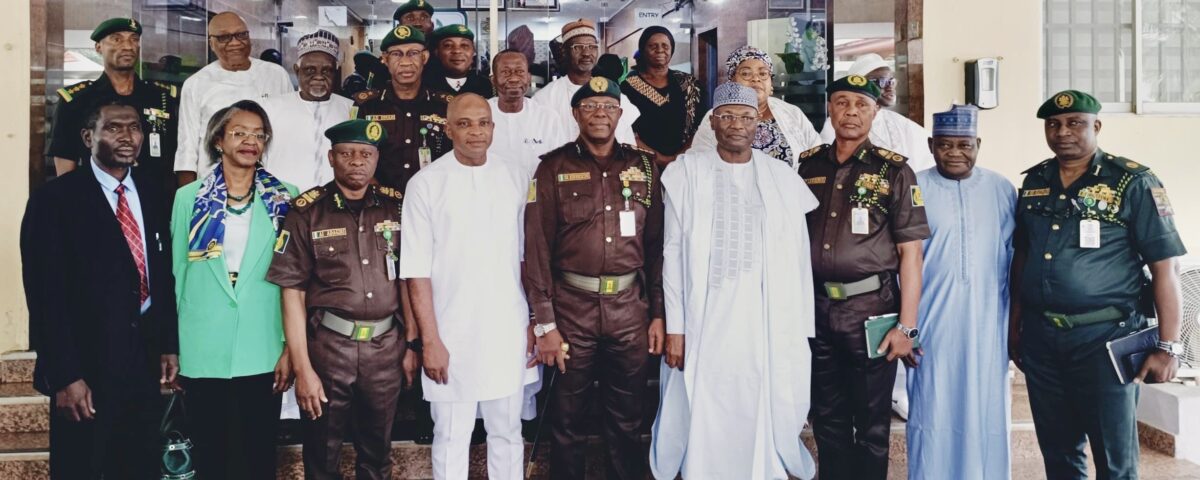- Have any question(s)?
- editor@inecnews.com

All Set For Resumption Of Nationwide CVR Aug 18
August 7, 2025
Bye-Elections: INEC Appeals For Adherence To Law
August 16, 2025INEC, NCoS To Engage National Assembly On Framework For Inmate Voting

INEC Chairman, Prof. Mahmood Yakubu (4th right), Controller General, Nigerian Correctional Service (NCoS), Mr. Sylvester Ndidi Nwakuche (5th right), National Commissioners and members of the NCoS delegation in a group picture during the courtesy visit on Friday 8th August 2025. PHOTO: TAIWO MAKANJUOLA
By Nathaniel Gana
Friday 8th August 2025
The Independent National Electoral Commission (INEC) has said it will work with the Nigerian Correctional Service (NCoS) and other stakeholders to engage the National Assembly for a clear legal provision on the voting rights of inmates in correctional facilities across the country.
Chairman of the Commission, Prof. Mahmood Yakubu, gave the assurance when the Controller General of NCoS, Sylvester Ndidi Nwakuche mni, paid him a courtesy visit at the Commission’s headquarters in Abuja on Friday, 8th August 2025.
Prof. Yakubu explained that the matter of inmate voting must be addressed within the framework of the law, noting that elections are governed strictly by legal provisions. He stressed that the ongoing electoral reform process presents an important opportunity to clarify and strengthen the legal basis for extending the franchise to inmates in line with constitutional and international human rights standards. He underscored the need to resolve ambiguities in Section 12(1)(e) of the Electoral Act 2022, which limits registration to Nigerian citizens “not subject to any legal incapacity to vote under any law, rule or regulations in force in Nigeria.”
He said: “There are various interpretations as to whether this provision relates to inmates on death row, those serving life sentences, or those convicted of treason. Our immediate task is to engage with the National Assembly for a clear legal provision on inmate voting. Thereafter, we can address the specific issues that may arise in the course of implementation.”
Prof. Yakubu recalled that INEC had previously held extensive engagements with the correctional service to consider modalities for inmate voting. These included the setting up of a joint technical committee to review operational issues, the sharing of data on the locations and categories of federal correctional facilities nationwide, and an assessment of how voter registration, polling unit creation, and voter education could be carried out within such facilities.
The Commission had also in the interest of transparency, raised questions about access for election observers, the media, and political parties, including whether campaigns could be conducted in correctional facilities and polling agents appointed on election day.
The INEC Chairman referenced landmark judicial decisions on the matter, notably the Federal High Court ruling in Benin on 16th December 2014 and the subsequent Court of Appeal decision of 7th December 2018, affirming the right of five plaintiffs awaiting trial to vote in elections. The courts held that, under Article 25 of the International Covenant on Civil and Political Rights (1966) and Section 25 of the Nigerian Constitution, awaiting-trial inmates retain their voting rights provided they assert the choice voluntarily. He further noted that inmate voting is already a reality in other countries, including Ghana, Kenya, and South Africa, where Nigerian election observers have witnessed the process firsthand.
The INEC Chairman commended civil society organisations, particularly the Carmelite Prisoners’ Interest Organization (CAPIO), for sustained advocacy on inmate voting, and welcomed what he described as the positive disposition of the joint committees of the Senate and House of Representatives on Electoral Matters toward inclusivity in Nigeria’s democratic process.
Earlier in his remarks, Mr Nwakuche said his visit was both to pay respect to the INEC Chairman and to formally raise the issue of extending voting rights to inmates. He described inmates as a community that may have been underserved and unnoticed despite their potential contributions to national development. He disclosed that the service currently holds over 81,000 inmates, 66 percent of whom are awaiting trial and are therefore presumed innocent under the law.
He argued that incarceration alone should not extinguish their civic rights, citing both court rulings and a recent resolution of the National Assembly in support of inmate voting. “I’m here, Chairman, to see how we can work together, even if it is not now but in the nearest future, to grant these inmates the right to vote. What are the things needed from our side as correctional officers? What are the things needed from your side? We must ensure that these people are not denied their rights,” he said.
Mr. Nwakuche also emphasised that inmate voting is not only about rights, but also about the dignity of citizenship and the principles of inclusivity in a democracy.
Responding, Prof. Yakubu reassured the NCoS boss that the Commission shares the same determination to extend the franchise to eligible inmates, adding that the meeting had reaffirmed the resolve to pursue the necessary legal and operational measures to make inmate voting a reality in Nigeria.

